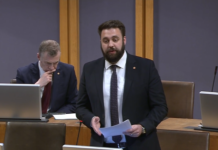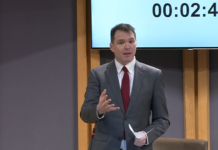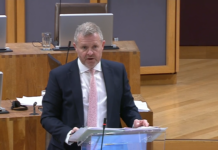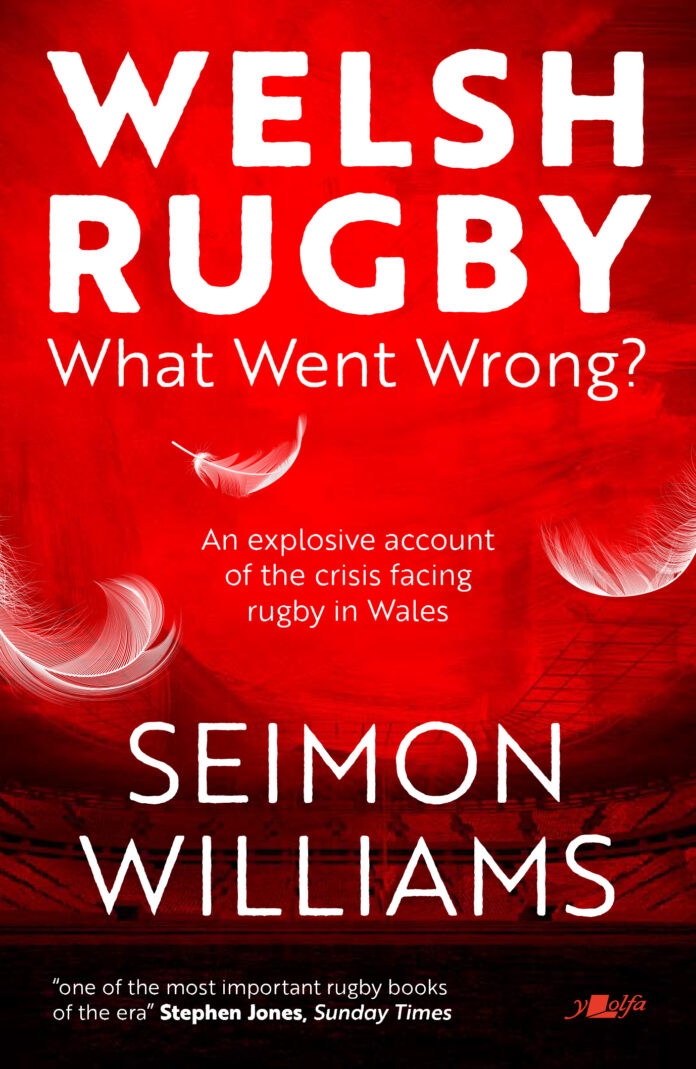The damning Rafferty Report, which paints a grotesque picture of the Welsh Rugby Union as a hive of misogyny, bullying and incompetence, has been welcomed by the author of a new book on the game in Wales in the professional era.
It certainly didn’t come as a shock to Seimon Williams whose masterly Welsh Rugby: What Went Wrong? charts the tragi-comic progress of the game in Wales from the end of the second Golden Era in the early 1980s.
He said: “Sport Resolutions’ independent review, led by Dame Anne Rafferty, into the culture of the Welsh Rugby Union proves a dispiriting, if unsurprising, read.
“It was ultimately triggered by a BBC Wales Investigates programme in which damning accusations were made against the WRU. It appeared to be an organisation riven by a culture of misogyny and sexism and homophobia and racism.”
It confirms Williams’ own findings in his book which is a comprehensive telling of the wasted decades as he charts every tortured stumbling step of Wales’s journey into that hard-headed new world of professionalism.
The book doesn’t make for cheerful reading but is a valuable addition to the findings of the report in which one WRU Director admitted: “The WRU Board was both frightened of what they had to do and unaware of what they had to do: If I ask the right question, I don’t know what to do with the answer. So, it’s much better not to ask the question”.
Williams said: “An atmosphere of powerlessness and fear stalked the corridors for a not insignificant number of staff. The report finds that the WRU could be an unforgiving, even vindictive place.
“When problems were identified, the WRU’s default approach appears to have been to issue Non-Disclosure Agreements, and to therefore effectively sweep issues under the carpet.
“It is the offhand, almost casual nature of the misogyny, in particular, that is so difficult to understand. Many instances are highlighted, including insinuations that a female member of staff had slept her way into a senior job, and of homophobic slurs directed at, particularly, women in same-sex relationships.
“And it is clear that a culture of – utterly unwarranted – arrogance has gripped the WRU for years.
“The treatment of Amanda Blanc – then-chair of the Professional Rugby Board and a sitting member of the WRU Board – beggars belief. In testimony which is reproduced in full the reader is treated to an astonishing litany of disrespect, of condescension and of ignorance.”
Williams’ book was inspired by the events of early 2023, events which contributed to the establishment of the Rafferty Inquiry and it highlights many of the lowlights of the WRU’s dark journey through the years of professionalism.
They include their use of an £84 million TV windfall to buy a hotel and build a zipwire attraction on the roof of the Millennium Stadium when Wales’ cash-strapped regions have been finding it increasingly hard to compete.
While the WRU has now redirected some of the CVC money towards payments to the professional game, it is still cutting the cash paid out to its four struggling regions from £23.5 million to £18 million by next season when the four Irish provinces are receiving £50 million a year between them and the two Scottish pro sides share around £20 million.
On the pitch a weekend of home matches against opposition from South Africa, Ireland and Scotland saw all four Welsh regions go down to defeat leaving the Ospreys tenth in the 16-team league and Cardiff, Scarlets and the Dragons 13th, 14th and 15th.
It was the first time since the formation of the current regional teams in 2003 that all four had lost at home on the same weekend.
Williams said: “It was unfair to keep the money away from the regions at a time when the game in Wales is in such financial peril.
“If the national team is getting smashed and the Welsh regions are getting smashed then the attractiveness of the product that is Welsh rugby is diminished.
“For most of the last 25 years there has usually been at least one Welsh region that has been competitive at European level but we are miles off that now and with budget cuts the regions are going to be less and less competitive.
“It’s difficult to see how that gets turned round. The WRU have just published accounts that show they turned over more than £100 million but every area of the game is struggling to survive.
“They have now had to divert money back to the regions but it all seems too little too late.”

It’s a subject that also infuriates the doyen of rugby writers, Stephen Jones, of The Sunday Times, who has written the foreword to the book in which he says: “The triumph of Seimon Williams is that he has codified all the horror decisions, the useless administration, all the silly calls and self-interest and codified it all into one authoritative, powerfully-researched book which deserves to become seen as the history of years in which Welsh rugby has always teetered on the edge of disaster.”
Williams, a Welsh speaker from Waunarlwydd, who has spent much of his working life at Bangor University and is a longtime contributor to the rugby fansite Gwladrugby, certainly brings an academic rigour to his research but the book is not a dry and dusty research tome.
The structure of the game in Wales has been a botched mess made more difficult by the comparative lack of cash and worsened by the short-sightedness and self-interest of administrators and club diehards.
Williams tells how the Welsh representatives stormed out of a meeting with the top English clubs because they were only offered five places out of 20 in the two divisions of a planned Anglo-Welsh League way back in 1999.
That proved to be a massive misjudgement – Welsh rugby had strong and long-established links with the big English clubs, many of them just over the border in Gloucester, Bath and Bristol, and an Anglo-Welsh competition would have been a natural arena for them.
Instead the Welsh regions stumble along in the wake of the Irish, the Scots and the South Africans in the United Rugby Championship with few if any fans making the long journeys to watch their sides getting thrashed in Pretoria or Johannesburg – or Dublin or Glasgow.
Gatland has again woven his hard-nosed magic at international level, helped by a core of talented and committed players, but below that level life is far from rosy for the regions
It is a story of wasted years, missed chances and vicious infighting as David Moffett, the Kiwi who was Chief Executive Officer of the Welsh Rugby Union, recalls.
He said: “The Welsh are always at war with themselves. And you can see it now. It’s bizarre, because if they actually stopped to think, and said, ‘You know, we’re going to actually unite, as Welsh people,’ they’d be special. But it’s never going to happen.”
Intriguingly at least twice the idea of one of the four Welsh regions being based in North Wales has been proposed only to be swiftly booted into touch – it could have been similar to the way Ireland have nurtured the former rugby backwater of Connacht.
The team from Ireland’s north-west, a region best known for hurling and Gaelic football, currently sit proudly at the top of the United Rugby Championship while Wales’s best, the Ospreys, are tenth.
Seimon Williams clearly has a deep devotion to the game in Wales but he warns: “For Welsh rugby to survive, let alone thrive, it must break the unhealthy habit of 140 years and unite, at all levels.
“The difficulties of the past year could amount to no more than a pause before Wales disappears as a serious rugby nation. Or it could be the springboard from which we reset and revive.”
His book is a tremendous and thorough telling of Welsh rugby’s collision with the professionalising of the game, it is wonderfully thorough and he has spoken to very many influential and knowledgeable people.
Welsh Rugby: What Went Wrong? by Seimon Williams is published by Y Lolfa on Monday, November 20, price £9.99.
Help keep news FREE for our readers
Supporting your local community newspaper/online news outlet is crucial now more than ever. If you believe in independent journalism, then consider making a valuable contribution by making a one-time or monthly donation. We operate in rural areas where providing unbiased news can be challenging. Read More About Supporting The West Wales Chronicle




















